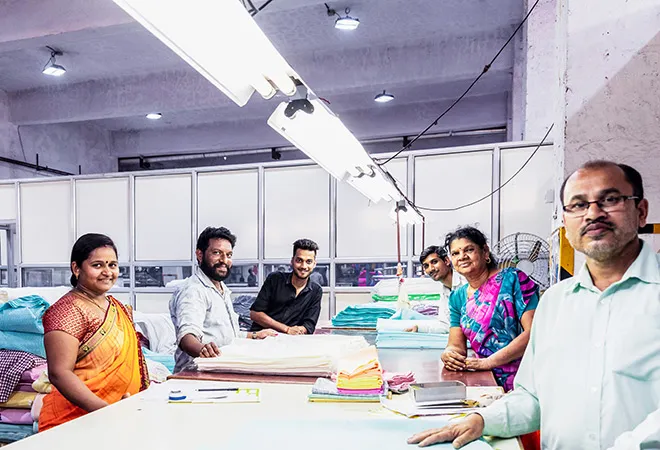
The novel Coronavirus has introduced the novel concept of organisations and institutions across the world making mandatory ‘work from home’ policies. The policies have been initiated in order to curb the spread of the virus and propagate necessary social distancing, so that employees are not affected by crowded commutes and workplaces. At a time when the global pandemic requires proactive and aggressive defence, countries worldwide have adopted this formula, notwithstanding the risk it poses to the economy.
The Indian Council of Medical Research has reported that India is currently in Stage-2 of the pandemic, where the source of the virus is known and the chain can be traced, before community transmission ensues. The state of Maharashtra is currently the hotspot in India, with 101 confirmed cases and 3 deaths as of 24 March. The state government has called for all workplaces across Maharashtra to close till 31 March. This measure comes after the order merely a week ago where the Municipal Commissioner urged companies to ensure that not more than 50 percent of employees should be present in the workplace at the same point of time. Having already closed 76 trains on 19 March, the government on 21 March closed all private and public transport, only allowing the movement of emergency personnel and essential goods. As these modes of public transport are the lifelines of working people in the state, cutting them off would essentially grind the city to a standstill. On 23 March the Chief Minister announced a statewide curfew where all district borders would be sealed with no inter-district transportation other than for essential goods. This will affect the businesses severely as most have their factories and manufacturing centers on the outskirts of the main cities of Mumbai and Pune.
These trying times have catapulted us into a here-to-fore distant digital age, where companies and governments must adopt pandemic related social security measures as part of contracts, leave structures, and human resource management.
- COVID19’s effect on business and contractual obligations
The effect of Coronavirus has badly affected cargo and cruise businesses in Mumbai, with 20 percent of import and export business being affected, according to officials from the Jawaharlal Nehru Port Trust. Tour operators in Maharashtra have also been asked to cancel international tours and holiday packages, after the first cases of the virus in the state were caused by a travel company bringing back tourists from Dubai.
These business closures have brought into focus the clause of “Force majeure”, usually embedded at the end of contracts, where parties account for unforeseeable events in which a contract must be dissolved due to “acts of God.” Due to the pandemic, businesses across the world will be grappling to fulfill contractual obligations, due to workforce shortages imposed by the government or the business itself. Volvo Group recently made an announcement that the consequences of the Covid-19 outbreak is affecting them, and the impact is largely associated with workforce shortage in the production and supply chain disruptions. As a truck, bus, and construction equipment group that sells to numerous vendors, Volvo’s contractual obligations will suffer.
Similarly, event managers have also been hit by the ban on social gatherings and conferences, with connected vendors of hotel and travel agencies facing the brunt as well. Tour companies affected by dwindling business in Maharashtra must now negotiate with customers, with some already refusing to provide refunds on the forced cancellations.
The seemingly offhand clause of “force majeure” will now become integral, and companies will have to reconsider how to quantify the bearer of risk during such events. The word ‘pandemic’ will have to be included within the unforeseeable events listed, such as floods, earthquakes, fires etc. The grey area of a government’s ‘warning’, versus actionable legal ‘bans’ will have to be traversed as well; for example, the Maharashtra government moved from a mere “warning” against social gatherings to a ban in the matter of a week, which would need to be scrutinized in a contract dispute.
- Social protection for informal labourers must account for pandemics
Companies categorically need to revamp their leave structures and employee benefit structures to incorporate disruptions caused by pandemics; however, governments must ensure that informal labourers that are not protected by these measures are not adversely affected by the pandemic’s damage to the economy.
Several companies have created policies to support their employees in these uncertain days. Tata Steel has tweaked its leave policy to include a “special leave” for employees that need to self-quarantine based on perceived exposure, and RPG enterprise has created an “exceptional leave” policy with full pay for the same. Twitter has stated that all employees, including hourly workers, will receive reimbursement toward their home office set-up expenses. Furthermore, they are also working with their vendors to ensure contractors’ work from home needs are met.
While these customized initiatives are laudable, informal labourers are not equipped with the same security. According to the Periodic Labour Force Survey (PLFS) 2017-2018 of India, 68.4 percent of all workers in the ‘non-agriculture’ sectors and relevant agricultural sectors (such as animal production, aquaculture, fishing, and support activities to agriculture) were engaged in the informal sector. Among the male workers, informal workers accounted for 71.1 percent of the workforce, and among female workers, informal workers accounted for 54.8 percent of the workforce.
Even if an individual is engaged in salaried labour, s/he does not fall into a formal employment structure unless the requisite employee benefits and contractual arrangements are attached. In India, more women work without these employee benefits than men. In 2017-18, among regular wage/salaried employees in the non-agriculture sector, 49.6 percent workers were not eligible for any social security benefit: 49 percent among males and 51.8 percent among females. In urban areas, 47 percent of the male salaried workforce was not eligible for any social security benefit, with 50.1 percent women making up the share that were not eligible for any social security benefit.
With this overwhelming proportion of the workforce already facing issues of lack of job security and employment benefits, governments need to include pandemic-related clauses into social protection schemes. E-commerce companies ranging from Flipkart and Snapdeal to Paytm and Uber are aggressively promoting mandatory remote working among employees during this pandemic, with required protections – however, the delivery agents and drivers involved in these companies must be provided with the same benefits. E-Commerce platforms like Swiggy, Uber, UrbanClap have increased employment in India multifold; food delivery provider Zomato, which has operations across 550 cities in India, has approximately 2.5 lakh people engaged in delivering orders. However, these workers rely on customer demand for their earnings – as pandemics greatly affect the use of the service, which in turn affects earnings, which must be taken into account.
An article assessing the effect of the Coronavirus lockdown on American class inequities shows that the pandemic has brought into sharp focus the “vast digital underclass” – people who need to be out in the world in order to help us quarantine and work from home. These include delivery agents, grocery store workers, sanitation workers etc. While many companies have moved online during this period, we have been pushed into the digital era without having streamlined the side-effects on the employment of this digital underclass and informal labourers. We must now fast-track the adaptation of contracts, adoption of social protection, and retention of the lost and insecure workforce that has sprouted because of an untimely digital hibernation.
The views expressed above belong to the author(s). ORF research and analyses now available on Telegram! Click here to access our curated content — blogs, longforms and interviews.




 PREV
PREV


